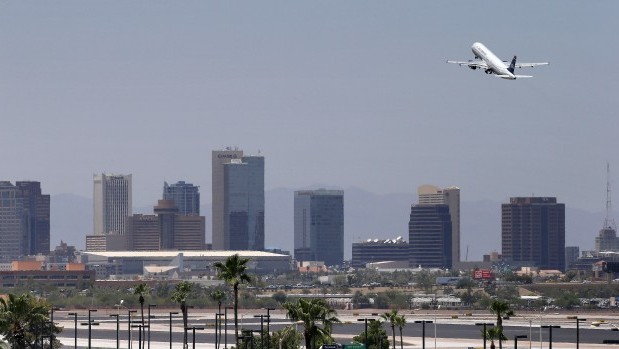
A jet takes off from Sky Harbor International Airport, Friday, June 28, 2013 in Phoenix. Airlines are monitoring the soaring temperatures to make sure it’s safe to fly as excessive heat engulfs much of the Desert Southwest (AP Photo/Matt York)
Forecasters said temperatures in Las Vegas shot up to 46 degrees Celsius on Saturday afternoon, two degrees short of the city’s all-time record.
Phoenix hit 48.3 degrees Celsius by mid-afternoon, breaking the record for June 29 that was set in 1994. And large swaths of California sweltered under extreme heat warnings, which are expected to last into Tuesday night—and maybe even longer.
The forecast for Death Valley in California called for 53.3 degrees Celsius Saturday, but it was a few degrees shy of that, according to unofficial reports from the National Weather Service. Death Valley’s record high of 56.6 degrees Celsius, set a century ago, stands as the highest temperature ever recorded on Earth.
Las Vegas fire and rescue spokesman Tim Szymanski said paramedics responded to a home without air conditioning and found an elderly man dead. He said while the man had medical issues, paramedics thought the heat worsened his condition.
Paramedics said another elderly man suffered a heat stroke when the air conditioner in his car went out for several hours while he was on a long road trip. He stopped in Las Vegas, called for help and was taken to the hospital in serious condition.
The heat wave has sent more than 40 other people to hospitals in Las Vegas since it arrived Friday, but no life-threatening injuries were reported.
“We will probably start to see a rise in calls Sunday and Monday as the event prolongs,” Szymanski said in a statement. “People’s bodies will be more agitated the longer the event lasts and people may require medical assistance.”
About 100 miles (160 kilometers) south in Baker, the temperature peaked at an unofficial 47.22 degrees Celsius in the road tripper’s oasis in the Mojave Desert on Interstate 15. The strip of gas stations and restaurants between Los Angeles and Las Vegas is known by travelers for the giant thermometer that often notes temperatures in the triple digits.
Elsewhere in Southern California, Palm Springs peaked at 50 degrees Celsius while the mercury in Lancaster hit 43.9 degrees Celsius—a record.
To make matters worse, National Weather Service meteorologists John Dumas said cooling ocean breezes haven’t been traveling far enough inland overnight to fan the region’s overheated valleys and deserts.
Cooling stations were set up to shelter the homeless and elderly people who can’t afford to run their air conditioners. In Phoenix, Joe Arpaio, the famously hard-nosed sheriff who runs a tent jail, planned to distribute ice cream and cold towels to inmates this weekend.
Officials said personnel were added to the Border Patrol’s search-and-rescue unit because of the danger to people trying to slip across the Mexican border. At least seven people have been found dead in the last week in Arizona after falling victim to the brutal desert heat.
The heat was so punishing that rangers took up positions at trailheads at Lake Mead in Nevada to persuade people not to hike. Zookeepers in Phoenix hosed down the elephants and fed tigers frozen fish snacks. Dogs were at risk of burning their paws on scorched pavement, and airlines kept close watch on the heat for fear that it could cause flights to be delayed.
